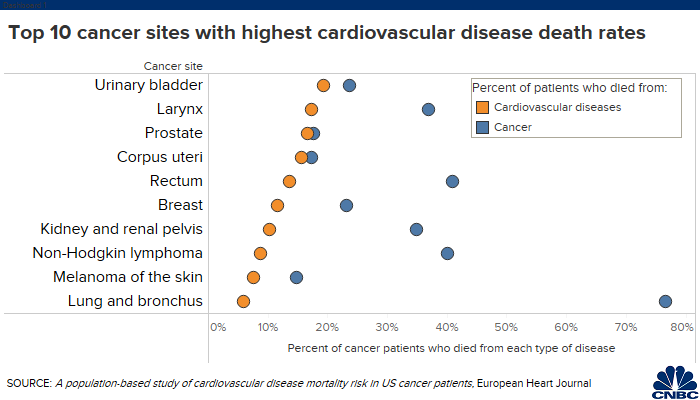Science Photo Library – ROGER HARRIS | Brand X Pictures | Getty Images
Cancer patients have a higher risk of dying from heart disease and stroke with 10% of all cancer patients dying from cardiovascular problems, not cancer, according to a new study published in the European Heart Journal.
For some cancers, including breast, prostate, endometrial and thyroid cancer, the risk is even higher. Roughly half of those patients die from cardiovascular disease, according to a team of researchers led by the Penn State College of Medicine.
The researchers looked at the U.S. general population compared to 3.2 million U.S. patients who had been diagnosed with cancer between 1973 and 2012. Among the cancer patients, 38% died from cancer and 11% died from cardiovascular diseases, including heart disease, high blood pressure, cerebrovascular disease, blocked arteries and damage to the aorta. Of those who died from cardiovascular diseases, 76% were due to heart disease. The researchers looked at 28 different types of cancer and took into account factors that could affect the results, such as age, race and sex.
“We’ve known that cardiovascular disease deaths are an important competing cause of death, but we didn’t know exactly how much and we didn’t know for how many cancers,” said Dr. Nicholas Zaorsky, an author of the study and radiation oncologist at Penn State College of Medicine and Penn State Cancer Institute. “We saw at least five or six different cancers where cardiovascular disease deaths have actually surpassed the deaths from the cancer that the patients have.”
These types of cancer include uterine, prostate and breast, he added.

The researchers found that the majority of the deaths from cardiovascular diseases occurred in patients with breast cancer and prostate cancer, the two most commonly diagnosed cancers. In 2012, 61% of all the cancer patients who died from cardiovascular diseases had been diagnosed with breast, prostate or bladder cancer.
The cancer sites with the largest percent of deaths from cardiovascular diseases included the bladder, larynx and prostate. Cancer patients with who were more likely to die from their cancer than from cardiovascular diseases had the most aggressive and difficult-to-treat cancers, like lung, liver and brain cancer.
As the number of cancer survivors increases, Zaorsky said, the rate of cardiovascular deaths will continue to rise. Throughout the 1900s, a lot of the cancers diagnosed were deadly, but more recently there have been tests that have helped diagnose cancers that are a lot less aggressive. This means more people are considered “cancer patients,” but they’re more likely to die from another cause, not their cancer. Cardiovascular diseases are one of the main other causes in the U.S., Zaorsky said.
He and his research team found that the risk of death from cardiovascular diseases for cancer patients is several times that of the general population in the first year of diagnosis and, for the most part, the risk increases for ten years or more. The researchers said that if more cancer survivors are aware of this risk, they may make healthy lifestyle choices that could decrease their risk of both cardiovascular disease and cancer recurrence.
One reason that cancer patients are more at risk of dying from cardiovascular diseases within the first year of a diagnosis could be that when they entered the hospital, other illnesses and problems were also detected, Zaorsky said. Another reason could be the aggressive treatment that comes after a cancer diagnosis.
The findings underscore the importance of multidisciplinary care for cancer patients, like cardio-oncology, a field that combines cardiology and oncology, the researchers said.
Oncologists in the U.S. typically follow guidelines from the National Comprehensive Cancer Network, which are a “a good resource for a lot of physicians to prevent competing deaths,” Zaorsky said.
“We want to help prevent these cardiovascular deaths,” Zaorsky said. “We hope that this kind of work will help shape those guidelines in the future.”
The study was funded by the National Institute of Health and American Cancer Society.
 EU News Digest Latest News & Updates
EU News Digest Latest News & Updates



